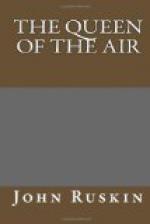55. Beyond, and entirely unaffected by, any questionings of this kind, there are, therefore, two plain facts which we should all know: first, that there is a power which gives their several shapes to things, or capacities of feeling; and that we can increase or destroy both of these at our will. By care and tenderness, we can extend the range of lovely life in plants and animals; by our neglect and cruelty, we can arrest it, and bring pestilence in its stead. Again, by right discipline we can increase our strength of noble will and passion or destroy both. And whether these two forces are local conditions of the elements in which they appear, or are part of a great force in the universe, out of which they are taken, and to which they must be restored, is not of the slightest importance to us in dealing with them; neither is the manner of their connection with light and air. What precise meaning we ought to attach to expressions such as that of the prophecy to the four winds that the dry bones might be breathed upon, and might live, or why the presence of the vital power should be dependent on the chemical action of air, and its awful passing away materially signified by the rendering up of that breath or ghost, we cannot at present know, and need not at any time dispute. What we assuredly know is that the states of life and death are different, and the first more desirable than the other, and by effort attainable, whether we understand being “born of the spirit” to signify having the breath of heaven in our flesh, or its power in our hearts.
56. As to its power on the body, I will endeavor to tell you, having been myself much led into studies involving necessary reference both to natural science and mental phenomena, what, at least, remains to us after science has done its worst; what the myth of Athena, as a formative and decisive power, a spirit of creation and volition, must eternally mean for all of us.




